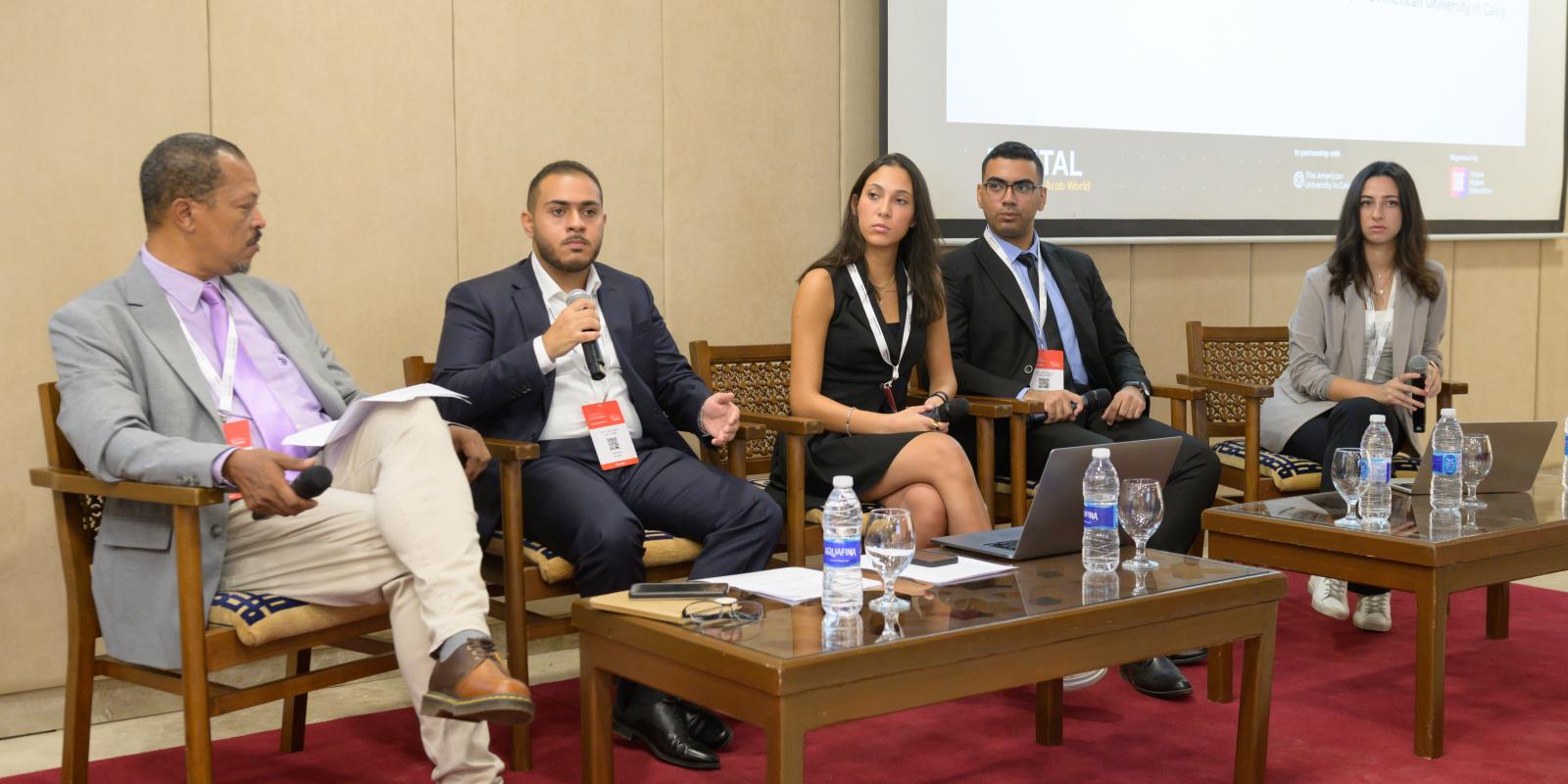
AUC Students Discuss the Future of AI on University Campuses
“[Online learning] is a double-edged sword. Some students are going to say they like it, and others are going to disagree.” This was one of many takeaways from last week’s Digital Universities Arab World conference, hosted by AUC and co-organized with Times Higher Education and the American University of the Middle East.
In a panel discussion titled “What are students’ expectations of digital universities?” AUC students shared their thoughts on topics such as the use of AI and online learning platforms. Here’s what they had to say.
Current Role of AI for Students
From website-building and information gathering to grammar checks, the students agreed that AI is a powerful and useful tool in their studies, internships and jobs.
Within scientific fields, biology junior Laila Khalifa said, “We use [AI] for analyzing large genetic data sets, predicting genetic modifications and experimental outcomes, and even for [formulating] experimental design.” The implications of AI in scientific research could soon even extend to the diagnosis of patients, Khalifa shared.
Computer engineering senior Merna El Saaran used AI to streamline her work during her internship as a technical developer for RPM International. Instead of manually coding basic website layouts and designs, El Saaran had ChatGPT build the sites for her, allowing her to meet deadlines more quickly and focus on providing higher quality service.
Instead of manually coding basic website layouts and designs, El Saaran had ChatGPT build the sites for her, allowing her to meet deadlines more quickly and focus on providing higher quality service.
“Instead of [performing] repetitive tasks, we focused more on user needs, communicating with our clients and focusing more on complex integrations in our field,” said El Saaran. Mechanical engineering senior Mohamed Ibrahim also found AI to be a time-saving tool, helping him study more efficiently and write stronger sentences.
The Future of Digital Technology in Teaching
Beyond their past use of AI and digital tools, the students shared creative suggestions that could help pave the way for future use of digital resources in teaching and learning.
El Saaran sees a strong potential for digital growth when it comes to e-books and their interactive features. “Students can effectively engage with education materials anytime, anywhere, and on any device,” she said. She found that her friends at other universities are still purchasing and carrying around heavy traditional textbooks while at AUC, with online tools, she carries all her books on her laptop. Ibrahim enjoys the features offered by learning platforms like Blackboard and now Canvas, which helps professors organize materials and increases accessibility for students.
Meanwhile, mechanical engineering senior Shady Sawires is able to visualize car mechanics, for instance, using virtual reality at AUC’s VR Lab. “We’re [practicing] all these mechanical engineering technicalities just by using virtual reality,” Sawires said. He believes the future of AI is in customization. For instance, Sawires sees potential for an AUC-specific AI and imagines that every institution could soon have customized technology, too.
"We’re [practicing] all these mechanical engineering technicalities just by using virtual reality"
Responsibility in Instruction
The students were able to imagine incredible benefits from using technology in the classroom, but they were sure to point out the drawbacks and need for responsibility — and praise the ways in which universities like AUC are adapting to the technology.
Khalifa, for instance, mentioned that her data science teacher is already taking precautions while allowing students to use ChatGPT. “If we are to incorporate any information or code from [ChatGPT], we must first cite it and second, and most importantly, we must criticize it,” she said. “We need to be taught how to use AI both ethically and responsibly.”
Meanwhile, the other students acknowledged the inconsistent learning outcomes of online learning. El Saaran shared that most students prefer face-to-face learning as opposed to online learning, and Khalifa stated that online learning is only good for specific skills or to complement formal education at AUC. “Physical presence is irreplaceable,” she said.
“If we are to incorporate any information or code from [ChatGPT], we must first cite it and second, and most importantly, we must criticize it. We need to be taught how to use AI both ethically and responsibly."
Sawires, on the other hand, mentioned that he had a bad experience with online learning but is now happy to be taking a self-directed course on EdX alongside his studies. “It’s a double-edged sword,” he said. “Some students are going to say they like it, and others are going to disagree.”
As universities turn to incorporate modern tools and technology in pursuit of academic excellence, one thing is certain: students will be leading the way towards the future of digital technologies.
